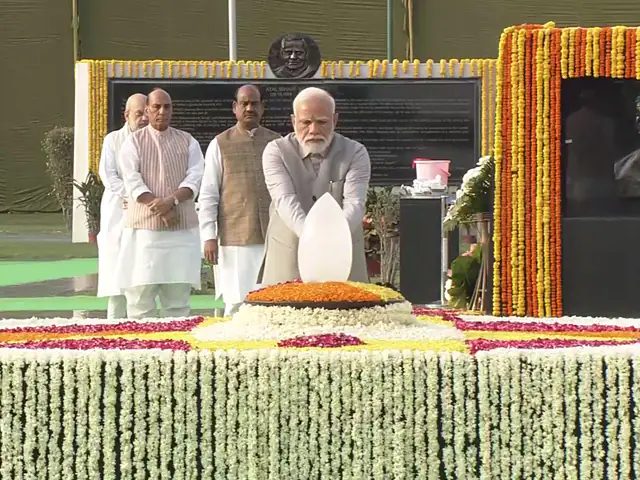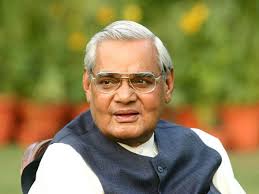On the occasion of the 5th death anniversary of Atal Bihari Vajpayee, a remarkable procession of leaders from across the political spectrum gathered at the ‘Sadaiv Atal’ memorial to pay their respects and offer floral tributes. This poignant ceremony marked a solemn moment of reflection on the legacy of a man whose visionary leadership and statesmanship left an indelible mark on India’s political landscape. The event not only celebrated his life but also reaffirmed the unity of purpose among leaders, transcending party lines, in honoring a statesman par excellence.
A Gathering of Respected Figures
The memorial ceremony witnessed the presence of some of the most respected figures in Indian politics. Prime Minister Narendra Modi, President Droupadi Murmu, and prominent leaders from the National Democratic Alliance (NDA) came together to remember and honor the legacy of Atal Bihari Vajpayee. The gathering was a testimony to the cross-party recognition of Vajpayee’s contributions and his role in shaping the nation’s destiny.

A Symbolic Act of Tribute
As the leaders laid floral tributes at the ‘Sadaiv Atal’ memorial, the atmosphere was somber and reflective. The act of offering flowers held a symbolic significance, representing not only a mark of respect but also a commitment to upholding the values and ideals that Vajpayee stood for. Amidst the hushed silence, the leaders paid homage to a man whose leadership extended far beyond the confines of party politics.
Fostering Unity Beyond Party Lines
One of the most striking aspects of the tribute ceremony was the unity displayed by leaders from diverse political backgrounds. Vice President Jagdeep Dhankhar, Amit Shah, Defence Minister Rajnath Singh, Nitin Gadkari, Rajya Sabha Deputy Chairman Harivansh, Praful Patel, Arjun Ram Meghwal, and Union Minister Anupriya Patel, among others, stood shoulder to shoulder in their collective tribute. This unity underscored the shared respect for Vajpayee’s contributions, transcending the usual divides of political ideologies.
A Personal Touch: Foster Daughter Pays Tribute
The ceremony took an emotional turn when Namita Kaul Bhattacharya, Atal Bihari Vajpayee’s foster daughter, stepped forward to pay her respects. Her presence added a personal touch to the event, reminding everyone of the human side of the statesman. As she offered her floral tribute, it was a poignant reminder of the impact Vajpayee had not only on the nation but also on those closest to him.
Expressions of Reverence
While the ceremony itself was a solemn affair, leaders also took to various platforms to express their sentiments. Prime Minister Modi, known for his eloquence, turned to social media to share his thoughts. On what was formerly known as Twitter, he wrote, “I join the 140 crore people of India in paying homage to the remarkable Atal Ji on his Punya Tithi. India benefitted greatly from his leadership. He played a pivotal role in boosting our nation’s progress and in taking it to the 21st century in a wide range of sectors.”
Legacy Beyond Time
Atal Bihari Vajpayee’s legacy is not confined to a single chapter in India’s history. Born in Gwalior in 1924, he emerged as the face of the Bharatiya Janata Party (BJP) for several decades. His tenure as India’s Prime Minister saw him achieve a significant milestone – being the first non-Congress Prime Minister to serve a full term in office. This achievement showcased his ability to garner support across the political spectrum and lead with a vision that transcended partisan boundaries.
A Statesman of Multifaceted Achievements
Vajpayee’s contributions extended beyond his prime ministership. His role as India’s External Affairs Minister in the cabinet of Prime Minister Morarji Desai from 1977 to 1979 highlighted his versatility as a statesman. His ability to navigate international relations demonstrated his depth of understanding and diplomatic acumen. His influence stretched far beyond domestic politics, firmly establishing him as a global leader.
A Heartfelt Farewell
The year 2018 marked a tragic moment in Indian history when Atal Bihari Vajpayee passed away at AIIMS Hospital in Delhi on August 16. The nation mourned the loss of a visionary leader, but his legacy continued to thrive. Prime Minister Modi’s decision to declare December 25 as Good Governance Day in honor of Vajpayee’s birthdate served as a testament to the enduring impact of his ideals.
Renewing Commitment to Vajpayee’s Vision
As the leaders paid their respects on the 5th death anniversary, they renewed their commitment to upholding the principles that Vajpayee championed. The ceremony was not just a tribute to a leader of the past but a call to carry forward his legacy into the future. Atal Bihari Vajpayee’s legacy serves as a beacon of leadership, wisdom, and unity in a world marked by rapid changes and evolving challenges.
As India strides confidently into the 21st century, the legacy of Atal Bihari Vajpayee remains as relevant as ever. The tribute ceremony was a poignant reminder of his enduring impact, reminding us that his vision and values continue to guide the nation’s trajectory. As leaders from diverse backgrounds paid their respects, they reaffirmed their commitment to preserving the legacy of a statesman who not only shaped India’s past but also continues to influence its present and future.













